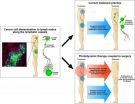(Press-News.org) Montreal, February 9, 2011 – Cortisol, the so-called stress hormone, seems to behave in contradictory ways in children. Some youngsters with behavioral problems have abnormally high levels of cortisol, while others with identical problems have abnormally low levels. What's going on?
Researchers at Concordia University and the Centre for Research in Human Development may have resolved the cortisol paradox. In a groundbreaking study published in the journal Hormones and Behavior, they link cortisol levels not simply to behavior problems, but to the length of time individuals have experienced behavior problems.
"We studied the relationship between cortisol levels in young people with problematic behaviour such as aggression or depression, and the length of time since the onset of these behaviours," explains Paula Ruttle, lead author and PhD candidate at Concordia's Department of Psychology. "Cortisol levels were abnormally high around the time problem behaviours began, but abnormally low when they had been present for a long time."
To obtain subjects' cortisol levels, researchers analyzed saliva samples taken from 96 young people during early adolescence. They then matched cortisol levels to behavioral assessments taken in childhood and again during adolescence. Problem behaviours were classified as either "internalizing" (depression and anxiety) or "externalizing" (aggression, attentional problems).
Riding the cortisol roller coaster
Youngsters who developed depression-like symptoms or anxiety problems in adolescence had high levels of cortisol. However, those who developed symptoms earlier had abnormally low cortisol levels. The conclusion? Cortisol levels go up when individuals are first stressed by depression or anxiety, but then decline again if they experience stress for an extended period.
"It seems the body adapts to long-term stress, such as depression, by blunting its normal response," says coauthor Lisa Serbin, a psychology professor who is Ruttle's PhD supervisor and Concordia University Research Chair in Human Development.
"To take an extreme example, if someone sees a bear in the yard, that person experiences a 'flight or fight' reaction," continues Serbin, a member of the Centre for Research in Human Development. "Stress levels and therefore cortisol levels go up. However, if the same person sees bears in the yard every day for a year, the stress response is blunted. Eventually, cortisol levels become abnormally low."
Aggressive behavior in early childhood
At first glance, study results from children with aggressive behavior and attentional problems seem to contradict this theory. In this group they found that low levels of cortisol were related to aggressive behavior both during childhood and adolescence. However, the authors contend that since aggressive behavior often begins in the second year of life or earlier, subjects may have been stressed for years before entering the study, resulting in abnormally low cortisol levels.
"This blunted response makes sense from a physiological point of view," says Ruttle. "In the short term, high levels of cortisol help the body respond to stress. However, in the long term, excessive levels of cortisol are linked to a range of physical and mental health problems. So, to protect itself, the body shuts down the cortisol system – but research shows that's not good either."
What, me worry?
Individuals with a blunted response to stress may not respond to things that would – and should – make other people nervous. For example, children with long-term behaviour problems perform poorly in school. Because of their blunted stress response, these youngsters may not be worried about exams, so they don't bother to prepare as much as their peers.
The study has many significant implications, according to Serbin. "This research suggests interventions should begin as soon as a behavioural problem appears," she says. "For children with severe externalizing problems, this may be very early, perhaps even when they are preschoolers or toddlers.
"We now have evidence that behavioural problems in children are linked to mental and physical health. Taking a 'wait-and-see' attitude may not be the right approach."
INFORMATION:
Partners in research:
This research was funded by the Social Sciences and Humanities Research Council of Canada and the Canadian Institutes of Health Research
About the study:
The paper, "Disentangling psychobiological mechanisms underlying internalizing and externalizing behaviors in youth: Longitudinal and concurrent associations with cortisol," published Hormones and Behavior, was coauthored by Paula L. Ruttle, Lisa A. Serbin, Dahlia Ben-Dat Fisher, Dale M. Stack and Alex E. Schwartzman of Concordia University and the Centre for Research in Human Development as well as Elizabeth A. Shirtcliff of the University of New Orleans.
Related links:
Cited research: http://bit.ly/eg7yuw
Concordia Department of Psychology: http://psychology.concordia.ca
Centre for Research in Human Development: http://crdh.concordia.ca
Media contact:
Sylvain-Jacques Desjardins
Senior advisor, media relations
University Communications Services
Concordia University
Phone: 514-848-2424, ext. 5068
Email: s-j.desjardins@concordia.ca
Twitter: http://twitter.com/concordianews
Concordia news: http://now.concordia.ca
Behavioral problems linked to cortisol levels
Concordia study finds intervention needed as soon as behavioral problems appear
2011-02-10
ELSE PRESS RELEASES FROM THIS DATE:
Beyond Alzheimer's: Research explores hippocampal sclerosis
2011-02-10
LEXINGTON, Ky. (Feb. 9, 2011) - The population of aged persons worldwide is expanding rapidly, and it is becoming increasingly clear that there are many different diseases that affect the minds of these individuals. Researchers at the University of Kentucky are breaking new ground in the ongoing project of identifying and defining those diseases most likely to affect an aged population. Dr. Peter Nelson of the University of Kentucky Sanders-Brown Center on Aging is the lead author on a paper soon to be published in the journal BRAIN; the paper deals with the little-understood ...
Crocodile tears don't fool us all
2011-02-10
How easy is it to fake remorse? Not so easy if your audience knows what to look for. In the first investigation of the nature of true and false remorse, Leanne ten Brinke and colleagues, from the Centre for the Advancement of Psychology and Law (CAPSL), University of British Columbia and Memorial University of Newfoundland in Canada, show that those who fake remorse show a greater range of emotional expressions and swing from one emotion to another very quickly - a phenomenon referred to as emotional turbulence - as well as speak with more hesitation. These findings have ...
Personal well-being is linked to national satisfaction, especially when times are tough
2011-02-10
The country where you live can have a big impact on your life. A new study of people from 128 countries finds that the more satisfied people are with their country, the better they feel about their lives—especially people who have low incomes or live in relatively poor countries.
The study, published in the latest issue of Psychological Science, a journal of the Association for Psychological Science, is based on a Gallup World Poll that reached about 1,000 people in each of 128 countries, obtaining a total of more than 130,000 responses. People were asked a series of ...
Cocaine production increases destruction of Colombia's rainforests
2011-02-10
Cultivating coca bushes, the source of cocaine, is speeding up destruction of rainforests in Colombia and threatening the region's "hotspots" of plant and animal diversity, scientists are reporting in a new study. The findings, which they say underscore the need for establishing larger protected areas to help preserve biodiversity, appear in ACS' journal Environmental Science & Technology.
Liliana M. Dávalos and colleagues note that the pace of deforestation in Colombia has accelerated over the past 20 years, even as population growth has slowed and the economy has shifted ...
Greener process for key ingredient for everything from paint to diapers
2011-02-10
Scientists are reporting discovery of an environmentally friendly way to make a key industrial material — used in products ranging from paints to diapers — from a renewable raw material without touching the traditional pricey and increasingly scarce petroleum-based starting material. Their report on a new catalyst for making acrylic acid appears in ACS Catalysis, the newest in the American Chemical Society's suite of 39 peer-reviewed scientific journals.
Weijie Ji, Chak-Tong Au, and colleagues note that acrylic acid is essential for making paints, adhesives, textiles, ...
Toward a fast, simple test for detecting cholera rampaging in 40 countries
2011-02-10
With cholera on the rampage in Haiti and almost 40 other countries, scientists are reporting the development of a key advance that could provide a fast, simple test to detect the toxin that causes the disease. The report appears in ACS' journal Bioconjugate Chemistry. Cholera affects more than 200,000 people annually, mainly in developing countries, and causes about 5,000 deaths. Many involve infants, children, and the elderly.
J. Manuel Perez and colleagues note that cholera is an intestinal infection from food or water contaminated with the bacterium Vibrio cholerae. ...
A green way to cap an old landfill
2011-02-10
This release is available in Spanish.
U.S. Department of Agriculture (USDA) scientist Pat Millner and safety manager David Prevar have worked with the U.S. Environmental Protection Agency (EPA) and private consultants to design and conduct a pilot study for an alternative way to cap landfills.
Millner is a microbiologist at the 6,615-acre Henry A. Wallace Beltsville Agricultural Research Center (BARC) operated in Beltsville, Md., by the Agricultural Research Service (ARS), the chief intramural scientific research agency of USDA.
Prevar oversees safety and health issues ...
Photodynamic therapy against cancer
2011-02-10
Tumor cells have several routes that enable them to move from the primary tumor to distant tissues, a process called metastasis. It is metastasis of the primary tumor that kills most cancer patients. One of the least studied routes of metastasis is the lymphatic system. Many tumors produce factors that promote the formation of new lymphatic vessels (lymphangiogenesis). The newly formed lymphatic vessels enable tumor cells to travel from the primary tumor to the regional lymph nodes from whence they can spread throughout the body.
Current treatment practice is to surgically ...
Challenges for biofuels: New life cycle assessment report from Energy Biosciences Institute
2011-02-10
A combination of rising costs, shrinking supplies, and concerns about global climate change are spurring the development of alternatives to the burning of fossil fuels to meet our transportation energy needs. Scientific studies have shown the most promising of possible alternatives to be liquid fuels derived from cellulosic biomass. These advanced new biofuels have the potential to be clean-burning, carbon-neutral and renewable. Some could also be delivered through existing pipelines and used in today's engines, replacing gasoline on a gallon-for-gallon basis with no loss ...
AGU journal highlights -- Feb. 9, 2011
2011-02-10
No tipping point for Arctic Ocean ice, study says
Using microearthquakes to evaluate potential carbon sequestration sites
Observing flares from Jupiter's aurora
Change in atmospheric patterns behind Arctic sea ice summer 2010 low
Antarctic ice sheet melting would affect sea ice margin, marine food chain
Simulating ocean carbon storage during the Last Glacial Maximum
Anyone may read the scientific abstract for any already-published paper by clicking on the link provided at the end of each Highlight. You can also read the abstract by going to http://www.agu.org/pubs/search_options.shtml ...
LAST 30 PRESS RELEASES:
The long standing commercialization challenge of lithium batteries, often called the dream battery, has been solved.
New method to remove toxic PFAS chemicals from water
The nanozymes hypothesis of the origin of life (on Earth) proposed
Microalgae-derived biochar enables fast, low-cost detection of hydrogen peroxide
Researchers highlight promise of biochar composites for sustainable 3D printing
Machine learning helps design low-cost biochar to fight phosphorus pollution in lakes
Urine tests confirm alcohol consumption in wild African chimpanzees
Barshop Institute to receive up to $38 million from ARPA-H, anchoring UT San Antonio as a national leader in aging and healthy longevity science
Anion-cation synergistic additives solve the "performance triangle" problem in zinc-iodine batteries
Ancient diets reveal surprising survival strategies in prehistoric Poland
Pre-pregnancy parental overweight/obesity linked to next generation’s heightened fatty liver disease risk
Obstructive sleep apnoea may cost UK + US economies billions in lost productivity
Guidelines set new playbook for pediatric clinical trial reporting
Adolescent cannabis use may follow the same pattern as alcohol use
Lifespan-extending treatments increase variation in age at time of death
From ancient myths to ‘Indo-manga’: Artists in the Global South are reframing the comic
Putting some ‘muscle’ into material design
House fires release harmful compounds into the air
Novel structural insights into Phytophthora effectors challenge long-held assumptions in plant pathology
Q&A: Researchers discuss potential solutions for the feedback loop affecting scientific publishing
A new ecological model highlights how fluctuating environments push microbes to work together
Chapman University researcher warns of structural risks at Grand Renaissance Dam putting property and lives in danger
Courtship is complicated, even in fruit flies
Columbia announces ARPA-H contract to advance science of healthy aging
New NYUAD study reveals hidden stress facing coral reef fish in the Arabian Gulf
36 months later: Distance learning in the wake of COVID-19
Blaming beavers for flood damage is bad policy and bad science, Concordia research shows
The new ‘forever’ contaminant? SFU study raises alarm on marine fiberglass pollution
Shorter early-life telomere length as a predictor of survival
Why do female caribou have antlers?
[Press-News.org] Behavioral problems linked to cortisol levelsConcordia study finds intervention needed as soon as behavioral problems appear


